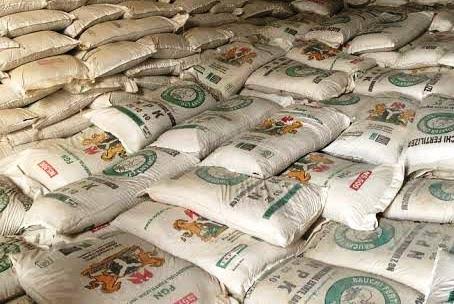By Palma Ileye
In continued efforts to bolster food production, reduce inflation and ensuring security, the Ministry of Agriculture and Food Security, FMAFS, has received 2.15 million bags of fertilizer from the Central Bank of Nigeria, CBN, to achieve this mandate.
Speaking during the Fertiliser Handover event and meeting with the Governor of Central Bank of Nigeria, CBN, Mr Olayemi Cardoso at the Ministry’s Headquarters in Abuja, the Minister of Agriculture and Food Security, Sen Abubakar Kyari assured that the received fertilizer would be judiciously used and delivered to the intended farmers so that they can reap the benefits of the huge gesture and inturn cultivate and produce more that would stem the galloping food inflation that was affecting the country.
However, Kyari said that the country has had a challenging period within the last seven or eight months, which by some reasons was beyond its control stating that from the era of COVID-19 food prices and food cultivation have been impacted in Nigeria and thereafter in 2021and 2022 the massive flooding that took place around the country.
He added, “The issue of Climate change has impacted in Agriculture in Nigeria. Policy on Naira redesign also impacted on Agriculture and on our rural low income farmers and it cropped into 2023, so those effects and some conflicts here and there as well as insecurity really impacted on Agricultural production.
“Those things I mentioned are on the decline, insecurity is on the decline and we are mitigating against climate change, we are sensitizing farmers to go into dry season agriculture and I was speaking with some of your team members on the need to boost and repair irrigation infrastructure so as to have all year round farming which is even more secured than that of the wet season farming.”
Also, the CBN Governor reiterated its unwavering commitment to prioritising price stability and instilling confidence in the Nigerian economy by upholding consumer price stability and ensuring a balanced foreign exchange market.
Cardoso stated that despite the prevailing challenges posed by inflation and currency depreciation, the Apex Bank remained resolute in its determination to surmount these obstacles.
He said that in pursuit of these shared goals, CBN was delighted to announce the allocation of 2.15 million bags of fertiliser, valued at over 100 billion naira, which he handed over to the Ministry of Agriculture and Food Security.
This contribution from the Central Bank he said aims to amplify food production capabilities and foster price stabilization within the agricultural sector.
“While transient inflationary pressures may persist, we anticipate substantial alleviation by the third quarter of 2024, coupled with diminished exchange rate strains. Our resolve lies in implementing policies that cultivate a resilient macroeconomic environment and enhance the welfare of all Nigerians.
“In pursuit of these shared goals, we are delighted to announce the allocation of 2.15 million bags of fertiliser, valued at over 100 billion naira, which we humbly hand over to the Ministry of Agriculture and Food Security. This contribution from the Central Bank aims to amplify food production capabilities and foster price stabilization within the agricultural sector.
“The Central Bank of Nigeria significantly emphasises maintaining price stability as one of its primary mandates. Food prices are a crucial component of inflation, especially considering that a substantial portion of household expenditure in Nigeria is allocated towards food and non-alcoholic beverages.
“This reinforces the critical need to address food inflation as a pivotal aspect of managing overall headline inflation rates. While the CBN has been implementing comprehensive measures to curb inflation, it is evident that in the short term, inflationary pressures may persist, predominantly driven by escalating food prices.
“This is precisely why we convene today to strengthen our collaboration with the Ministry of Agriculture to mitigate the surge in food prices. In alignment with our strategic shift towards focusing on our fundamental mandate, the CBN has veered away from direct quasi-fiscal interventions and transitioned towards leveraging conventional monetary policy tools for executing monetary policies effectively.
“In this light, we aim to extend our support and foster closer ties with Ministries, Departments, and Agencies, MDAs, with the mandate and expertise to undertake these critical initiatives. Consequently, we aim to enhance our partnership with the Ministry of Agriculture, bolstering your endeavours to enhance food productivity and security, ultimately curbing food inflation and fortifying our pursuit of price stability,” he explained.







